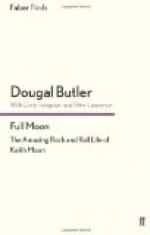“I do not see that.”
“Allow me to experiment on your arm. When I grip you firmly, as I do now, you can feel my fingers pressing their whole length on your flesh, can you not?”
“I can indeed,” said Dawfield, wincing. “You’ve a pretty powerful grip. I shall be black and blue.”
“The grip on Robert Turold’s arm is quite a different thing,” pursued Barrant earnestly. “Do not be afraid, I am not going to demonstrate again. It was more in the nature of a pounce—a sort of tiger-spring hold, made by somebody in a state of great mental excitement, with tightened muscles which caused a tense clutch with the finger-tips, the nails digging into the skin, the fingers bent and wide apart. My opinion is that it is a man’s grip.”
“Thalassa?”
“That I cannot say. He’s a cunning and wary devil, and I could get nothing Out of him last night. He says he was in the coal cellar when his master met his death. That’s where he showed his cleverness in protecting himself as well as shielding the girl, because if he was actually down in the coal cellar she might have gained entrance to the house and left it again without Thalassa knowing anything about it. He says that he admitted nobody, and heard nobody.”
“Perhaps he helped in the murder, and sprang on his master.”
“That is possible. But why should Thalassa spring on his master in maniacal excitement? To secure the revolver to shoot him? I can see no other reason. What happened afterwards? Robert Turold wasn’t shot immediately. Some seconds, perhaps minutes, elapsed. What took place in that brief yet vital space of time? Did Thalassa hold his master in a grim clutch while the girl took the revolver out of the drawer and shot him? What took Robert Turold to the clock in his dying moments? These are questions we cannot answer at present. But it is certain that whoever committed the murder left the room immediately after firing the shot, and the door was locked on the outside and the key removed. If the daughter committed the murder it was probably Thalassa who replaced the key in the room afterwards.”
“Have you any doubt on that point?”
“The probabilities point to Thalassa, but it was Austin Turold who actually picked up the key. It is as well not to lose sight of that fact.”
Inspector Dawfield looked up quickly, but his colleague’s face revealed nothing of his thoughts.
“Hadn’t you some idea that the marks on the arm might have been caused by the removal of the body into the next room?” he hazarded.
“Not now,” Barrant replied. “That theory was only tenable on the supposition that life was not completely extinct when the body was removed. But I interviewed Dr. Ravenshaw on that point last night, and what he told me disposes of that theory.”
“I heard something from one of my men this morning which may have some bearing on the case,” remarked Dawfield. “There has been a lot of local gossip about it. Robert Turold was generally regarded as very eccentric. When he crossed the moors from the churchtown to Flint House it was his custom to go almost at a run, glancing over his shoulder as he went, as if afraid.”




